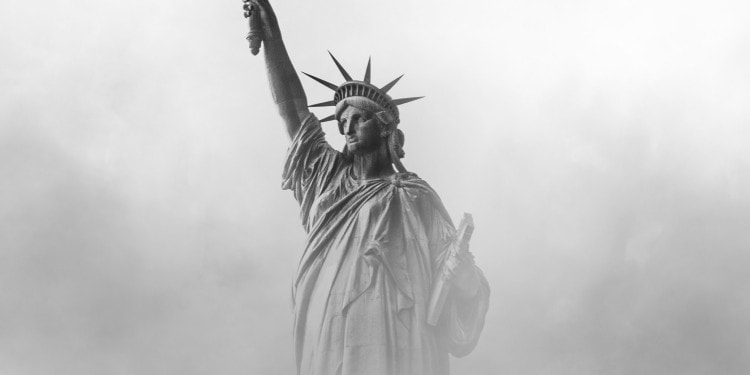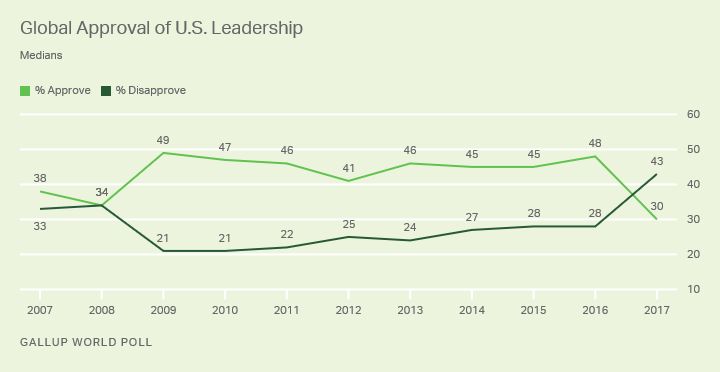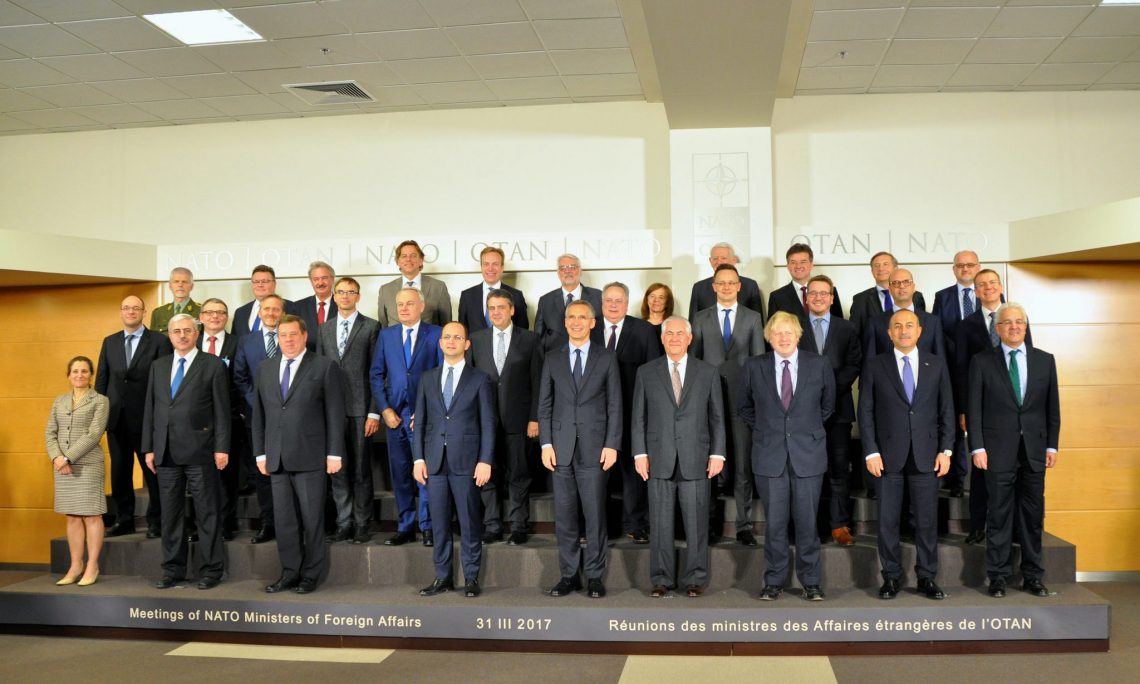In 2017, America abruptly changed face. It became a deeply divided country no longer interested in world leadership, its soft power eroding fast. The question is: Who will dominate next, China, Europe, Russia? Or can America recover?
Trump’s inaugural speech with its America First message shook the world. And he has kept it up with alarming tweets, insulting and threatening people and countries, sowing confusion among America’s allies and foes. He is, in his first year, the least popular President in US history and has signed fewer laws than Obama, yet, with support from the Republican Congress, he has managed to bring deep change: He has successfully turned America in on itself and ushered an age of small government and Big Business.
His first year also marks the end of the “American century”. A Gallup poll survey released on January 18 shows that the world’s approval of American leadership dropped to a new low in 2017, down to 30 percent from 48% under Barack Obama – and even lower than the lowest point reached by George W.Bush in 2007.
As explained by Gallup’s Julie Ray, out of 134 countries surveyed, U.S. leadership approval ratings “declined substantially — by 10 percentage points or more — in 65 countries that include many longtime U.S. allies and partners”, placing the US on a “nearly even footing with China (31%) and barely more popular than Russia (27%)”. In fact, Germany has replaced the US as the top-rated global power. US approval increased 10 points or more in just four countries: Liberia (+17), Macedonia (+15), Belarus (+11), and, unsurprisingly, Israel (+14).
In short, American soft power around the world has taken a serious beating, and unless a major policy change takes place, it won’t recover.
So what happened in 2017? The Federal government and institutions are now in the hands of the Republican party. Control over the Supreme Court was achieved with Trump’s appointment of Judge Gorsuch and federal district courts are now filling up with young judges wedded to conservative views. Federal environmental protection regulations are dismantled, the coal and fuel industries can do as they please, the environment and public health be damned.
The tax overhaul benefits primarily the Republican party’s backers, big corporations and multi-millionaires. It also comes with a provision to drill for oil in the Arctic National Wildlife Refuge. And this on top of huge rollbacks in natural reserves, opening up to private exploitation over 2 million acres in Utah.
The only area that has resisted the Trump-Republican onslaught is Obamacare, but not for long. As Trump said at the GOP tax bill celebration, “we peeled Obamacare because we got rid of the individual mandate which was terrible” which is, as he clarified, “a primary source of funding of Obamacare”.
Clever. One can only hope that the Republican party will come up with a solution for the millions of Americans slated to lose coverage. So far, there is none on offer. Foreign observers (myself included) marvel that America has still not accepted the principle of free universal access to healthcare, first launched in Germany in 1883.
In announcing the tax overhaul, Trump reminded his audience that he was holding to his campaign promise and making “America Great Again”.
To foreign ears, M.A.G.A is grating.
What is Trump talking about? America has been great now for a century, ever since it came out victorious of World War I. In fact, historians have taken to calling it “the American century” and it started in 1917 when America first became the uncontested power on the international scene, displacing the British Empire and putting a stop to Germany’s ambitions.
The immediate post-World War II period marked the height of American power. Inspired Americans ushered in a new world order. The Marshall Plan revived Europe and in a second time, America committed to bringing aid to developing countries. The World Bank, the International Monetary Fund and the United Nations, together with its specialized agencies – the World Health Organization, Food and Agriculture Organization, UNICEF (the Children’s Fund), UNESCO, AIEA, UNHCR etc. -, were all primarily American creations.
This was not a perfect world, it still needed improvement in terms of equity, democratization and accessibility. Arguably, it was too much in the hands of America, but compared to Trump’s world of dog bites dog, it was a real step forward to a future free of war, with justice for all.
Later, in the 60s and 70s, America’s momentum was maintained thanks to Federal Government support to scientific research, in particular through DARPA. A wave of ground-breaking innovations, notably the Internet and the digital revolution, launched Silicon Valley in the 90s, giving America supremacy in almost all areas of human endeavor, from science to finance.
This is the world most of us were born into, the “status quo” that Hilary Clinton unsuccessfully tried to defend against Trump.
This is the world that is now coming to an end. America’s image as the “shining city upon a hill”, with the “doors open to anyone willing to get here”, as Reagan said in his famous farewell address in 1989, is collapsing under the blows of Trump’s “America First” policies.
Caption: Closing remarks of Ronald Reagan’s Farewell Address from the Oval Office, 1/11/89 Music: Thomas Bergersen’s “Remember Me”. One wonders whether Trump ever saw this, but if he did, Reagan’s message did not sink in.
The Erosion of American Soft Power
A good leader leads by example, and America no longer does. The American model of democracy is broken. The proof? Trump’s electoral victory. Trump lost the popular vote by a greater margin than any other US President yet won the White House. Not because votes were rigged in favor of Hilary Clinton (as Trump maintains) but because the Republican party, investing in state races for decades, has redrawn the electoral map, tilting it in its favor by giving a bigger voice to conservative rural areas.
In America today, one man (or woman) does not equal one vote.
Worse, the Trump administration has no regard for either sustainable development or human rights, the two pillars of the UN Agenda 2030 adopted by the whole world in 2015.
Trump has formally withdrawn the US from the Paris Climate Agreement and by November, when Syria joined, it was the only country left out. And Trump has shown unrestrained support of Saudi Arabia in its horrific war in Yemen, bombarding hospitals, killing some 10,000 civilians, causing famine and the spread of cholera to one million people. A “catastrophe that shames Britain”, according to the UK Guardian noting the UK support to the Saudi, but it really shames the US.
In the photo: Exercise Valiant Shield wraps up. Credit: U.S. Navy photo/Petty Officer 2nd Class Jarod Hodge
American military power on the rise. Trump and the Republican party appear not to believe in American “soft power”. Secretary of State Tillerson has disemboweled the State Department, keeping key positions empty and delaying the appointment of top ambassadors. Now, with the flight of some 300 senior diplomats, “foggy bottom” has become a shadow of itself; further destruction will come when Trump gets his budget approved, with a 30 percent cut to the State Department.
America is betting on military power, forget diplomacy, forget soft power. The US Senate passed a $700 billion Pentagon bill in September, $30 billion more than Trump sought.
America has always had a fixation on military power, it is understandable, that is how it became a world leader. But military power wins battles – as it did in Vietnam, and more recently Iraq and Afghanistan – but it loses wars. For that, you need to win the peace, and that means wielding “soft power”, things like investment in development, building trade ties, propping up local culture and boosting cultural exchanges, respecting human rights. All of which America has been good at, until neo-liberal ideology began to nibble at it in the 1980s, spreading jungle capitalism and a winner-take-all mentality, making American soft power increasingly fragile, until Trump gave it the final kick.
This is a historic shift, and for foreigners, a deeply troubling one. Particularly with Trump’s nervous finger on the nuclear button. A quick-and-dirty nuclear war with North Korea is now in the realm of possibilities. The only thing that might prevent it is North Korean leader Kim Jong-un’s strong sense of self-preservation, he’s suddenly open to dialogue with South Korea.
In his New Year address, Kim Jong-un eschewed his customary Mao-style outfits, projecting a friendlier image to the West, one he probably learned when he attended school in Switzerland. Opening to South Korea is his response to Trump. He knows a nuclear war would be the end of his regime and his family.
Even in the financial area where America led in the fight for transparency, the US is fast turning into the next big tax haven, a new Switzerland. This is yet another result of the new tax code along with Congress’s refusal to force US banks to apply the standards of transparency required to do away with tax havens. As noted in a Bloomberg Op-Ed:
“…all this might look pretty smart: Shut down foreign tax havens and then steal their business. That would be the kind of thinking that’s undermining America’s standing in so many areas, from trade to climate change. Instead of using its power to establish an equitable system of global governance, it’s demanding a standard from the rest of the world that it refuses to apply to itself. That isn’t leadership.”
America is losing its status as leader in human rights, scientific research and the arts . At home, the Trump administration attacks on civil rights and on recent liberal gains are wide-ranging, from closing the borders to immigrants (including with a scaled-back renewal of a travel ban on 8 Muslim countries) and using the Department of Justice to prosecute marijuana use to dismantling the Environmental Protection Agency (thus missing out on renewables), opening the door to environmental destruction.
The Trump administration is also busy weakening the Centers of Disease Control and Prevention, cutting funds, sacking scientists and experts – even stooping down to petty details like attempting to stop the Centers from using terms like “science-based” and “evidence-based”.
Likewise, Federal support to the Arts, Humanities and Public Media is to be cut back. And America is already slowing down in the one area of undisputed leadership, technological innovation. In January 2018, for the first time, the US dropped out of the top ten in the Bloomberg Innovation Index since it was started six years ago, while South Korea and Sweden retained their ranking, respectively number one and two.
As to gun control, forget it, even mentally sick people are permitted to buy them.
In short, everything that used to make “America great” is going or gone.
2017: The End of the American Century
Trump would strongly disagree and he has been busy spreading counter propaganda to his fan base: in his year-end wide-ranging speech on national security, he said he successfully broadened U.S. influence throughout the world, and he painted China and Russia as America’s friends (though the national security document itself says otherwise). Let’s be kind to Trump and leave him to his delusions: This is just one more “alternative fact”, to use Kellyanne Conway’s apt term.
The truth is: the American century, because of Trump, is over.
 The question now is: what comes next, China, Europe, Russia? Or can America recover its lost leadership?
The question now is: what comes next, China, Europe, Russia? Or can America recover its lost leadership?
American collapse started five days after Trump had stepped into the White House, with the loss of the Far East to China. He made what is arguably his biggest strategic mistake: He tore up the Trans Pacific Partnership (TPP), declaring it a “bad deal”, presumably because it had been an Obama policy. Little did he realize that the TPP was a winning card for America, a clever way to circumscribe China’s power by including everyone around the Pacific rim expect China.
Now the TPP is revived without the US. And China is poised to fill the void left by the US with:
- Its huge Asia Infrastructure Investment Bank to rival with the World Bank and the International Monetary Fund;
- a $321 billion investment in renewable energy by 2020 and an ambitious program to curb carbon emissions by establishing the world’s largest market for trading emissions permits;
- the trillion dollar “Belt and Road” initiative spreading investment all the way to Europe and Africa.
This is raising military concerns on the way, especially for some big players like India. Yet, the policy is successful, the most recent victory clocked in Pakistan that, reacting to Trump’s tweet announcing a cut in aid, has agreed to revive its currency swap agreement with China.
It is clear who the next Asian giant is going to be – and it’s not America.
In the photo: U.S. Secretary of State Rex Tillerson stands with NATO colleagues for family photo at the NATO Photo Credit: US Embassy and Consulates in Turkey
Next, the loss of Europe. Trump made several mistakes here. He repeatedly attacked NATO members, accusing Europeans of not paying their due (not true). And in his first trip abroad in May, he did not start with Europe, as all his predecessors had done.
He broke with tradition and began with Riyadh, the capital of the world’s darkest, most feudal regime, Saudi Arabia, the cradle of Wahhabism, a deeply reactionary branch of Islam. This was followed by a stop in Israel, the full meaning of which surfaced at year-end, when Trump announced US recognition of Jerusalem as Israel’s capital.
This sent clear signals to Europeans that from now on, they were on their own. German Chancellor Merkel announced that Germany could no longer “fully rely” on the US, that “we Europeans really have to take our destiny in our own hands”. Likewise, French President Macron picked the gauntlet. For the first time ever, in his presidential state address on January 1, 2018, he talked to all Europeans, and not just the French people. He warned against nationalism, noting “Europe is a good thing for France. France cannot succeed without a strong Europe”.
For Europe, Brexit is a golden opportunity. Kicking the UK out of decision-making in Brussels means that the EU can at last move forward. Issues that have never been addressed before because of British opposition, now have finally a chance to find a solution.
It will be possible to build a common European defense system and shore up the Euro. If we consider that the Euro has managed to survive so far as a common currency without the necessary institutional architecture, i.e. a central treasury, it is close to a miracle. It also gives a measure of the strength of the European dream – stronger than the press, or academia (see Stiglitz’s book), generally give it credit.
SEE RELATED ARTICLE: DEATH OF THE EURO – THINKING THE UNTHINKABLE Book Review “The Euro: How a Common Currency threatens the Future of Europe” by Joseph E. Stiglitz
Contenders for World Leadership: Europe, China or Russia?
M.A.G.A. is Making Europe Great Again, but will Europe grab the chance?
While we have some strong Europe-committed politicians, France’s Macron, Germany’s Merkel and the EU Commission’s Juncker, not everyone is on board. The road in 2018 is uphill. Merkel is still working on a coalition agreement with former European Parliament President Martin Schulz, but if that happens (probably in March), he’s another strong European, a believer in the “United States of Europe”.
Moreover, Italy, the third largest EU member, will be delayed by parliamentary elections (set for 4 March). The populist anti-establishment Five Star Movement could get 27-28% of the votes and a tie-up is expected, with old-fashioned, conservative anti-European parties (Silvio Berlusconi’s Forza Italia and the Northern League) playing outsize roles.
The management of mass immigration remains an unresolved, burning issue, tearing apart EU members, as Italy and Greece take the brunt of immigrant waves while other EU members – especially Central Europeans – turn a blind eye. In fact, Eastern Europe is adrift, with dangerous anti-Brussels populist parties in the driving seat in Hungary, Poland, Austria, the Czech Republic and Romania. Poland in particular could turn into a serious test for Brussels.
Europe will no doubt take its time to solve its problems – and may never solve them.
That means China is in pole position to win world leadership in the 21st century. No doubt helped along by its authoritarian command-and-control structure. Despite serious economic and “corruption” problems.
Africa and Latin America will become the next battleground for China’s and Europe’s soft power.
Europe, benefiting from special relationships and deep cultural ties dating back to its colonial past in Africa and Latin America, is holding on with a flourishing trade and, at least in Africa, a pervasive military presence (mostly French) – recently encroached by China’s establishment of a military base in Djibouti.
Meanwhile China is fast making progress in Latin America, boosting trade ties with all countries except Mexico – so long as NAFTA holds. As noted in a recent Bloomberg article, “Trump should be worried”.
Russia the third contender (and equally authoritarian) is likely to look on. Edward Luce in his book proposes an intriguing role for Russia as a mediator in a future US vs. China war started over North Korea. The North Korean war hasn’t happened yet, and so far, only Cuba, suffering from a Trump-imposed freeze in diplomatic relations with the US, is now turning to Russia.
In the photo: With Iranian President Hassan Ruhani (left) and President of Turkey Recep Tayyip Erdogan. Photo Credit: Kremlin
Putin’s relations with the West have sunk to Cold War lows, largely because of his military wins in Crimea and eastern Ukraine. Moreover, in 2014 the collapse of oil prices sent the country in a deep depression – 20 million Russians, 14 percent of the population, now live below the poverty line.
For now, by all accounts, Putin is more concerned with political survival than with world leadership – hence his focus on Syria and scoring points in the Middle East. At first, it looked like Trump might successfully play the Saudi card. But when Saudi Arabia imposed a land-sea-air blockade on Qatar in June as part of its anti-Iran policy (the Saudis view Qatar as too friendly to Iran), it became clear Trump had chosen the wrong ally. Turkey sided with Qatar and Iran while Trump was forced to turn a blind eye since Qatar is host to America’s largest base in the Middle East.
While the US under Trump did help allies to drive out ISIS from Syria, it hasn’t been able to turn that victory to its advantage. When Trump announced by year end that the American Embassy would be moved to Jerusalem, Erdogan, the President of Turkey, was quick to point out in a Muslim summit of over 50 countries, that “From now on, it is out of the question for a biased United States to be a mediator between Israel and Palestine”.
Russia is now calling the shots and peace in Syria is in Putin’s hands, not Trump’s. Next year Russia aims to convene a “Syrian people’s congress” on January 29-30, to try and finally put an end to the Syrian war, not in Geneva, the usual meeting place, but in Sochi, the Russian Black Sea resort.
All this makes it impossible for countries in the Middle East to view America as anything else but an enemy. Trump’s travel ban on 8 Muslim countries merely confirms them in that view. Should Trump proceed in mi-January with reinstating sanctions on Iran, American isolation in the region will be total. The Iranian regime will take the sanctions as a pretext to regain power over opponents: nothing works better than pointing to an external foe. And Europeans will not follow suit (they have already said they won’t).
To take a measure of how isolated America had become by year end, look at the UN General Assembly vote condemning America on the Jerusalem question: 128 countries in favor, 9 against and 39 abstentions – this despite American threats to cut US funding to countries that did not support US recognition of Jerusalem as Israel’s capital.
The nine countries supporting America are negligible players on the world scene: Togo, Micronesia, Nauru, Palau, Marshall Islands, Guatemala and Honduras. And abstaining countries include erstwhile strong supporters: Canada, Mexico and populist Central European governments sympathetic to Trump.
In 2018, if NAFTA is re-written the way Trump wants, punishing Canada and Mexico, expect them, America’s closest allies and neighbors, to go next, and Latin America to follow. It doesn’t help when detention of Hispanic immigrants by US Immigration and Customs Enforcement (ICE) is on the rise, when 200,000 Salvadorans are sent back after a decade in the US and Trump makes disparaging remarks about Haitian refugees (they “all have AIDS”).
One thing is certain, the doors to the shining city upon the hill are closing.
What it will take for America to recover
The consensus abroad, even in a historically pro-American country like Germany, is that the US retreat from the world stage is likely to outlast Trump. Germany’s acting foreign minister and most popular politician, Sigmar Gabriel, memorably said in a speech in December, “the relations between the U.S.A. and Europe won’t be the same anymore — even when Donald Trump leaves the White House.” (highlights added)
Expect Trumpian policies to continue unchanged under a Pence presidency in the event Trump is forced out of office. He could leave early because the just-published Fire and Fury explosive exposé by journalist Michael Wolff has again fueled the debate over Trump’s mental incapacity leading to his removal under the 25th Amendment. Or what is more likely, he is impeached as a result of the Special Counsel investigation in Russian electoral meddling and possible links to the Trump campaign,
Trumpian policies, whether he is in or out of the White House, will continue because they are, on the whole, Republican policies – you could term them “post-Tea Party”, but Republican nonetheless. The weight of the Republican party is evident on the issue of immigrants: Trump most recently declared that he was willing to “take the heat” from his supporters for a “broad immigration deal” that would open the path to citizenship to millions.
To put a stop to Trumpian policies will require Democrats to win in both 2018 and 2020. But the chances of a Trump re-election (or of another Republican win) should not be underestimated. All that is needed is that Trump’s main campaign promises be met:
- more jobs are created in manufacturing, which is the goal of the just announced tax overhaul; and
- the crumbling American infrastructure system is repaired and rebuilt.
More jobs: How likely is it? The tax overhaul may lead to a short-term spurt in sales as people find more money in their bank account in 2018, but it won’t last long. For the middle class, by 2020, it will be gone. In any case, it is not likely to translate into more manufacturing jobs.
Republicans know this, and they have placed their hopes in the repatriation of funds by big corporations. But even if it happens, it’s not likely to boost investment in manufacturing. The reason is simple: Corporations prefer to invest in stock buybacks to increase their Wall Street valuation rather than create new jobs. It suits both shareholders and company managers (paid in stock options).
As recent history shows, this is exactly what happens every time there is a tax holiday. When George W. Bush offered such a tax holiday in 2004, 10 of the 15 largest repatriating companies cut jobs. Moreover, according to many analysts, American corporations currently don’t need the money, they are awash in capital and see few investment opportunities in the US.
Not only is an expansion in manufacturing jobs highly unlikely, but job losses have already started, due to yet another one of Trump’s false moves. Take the case of the steel industry: While it has been suffering for a long time (48,000 jobs lost since 2000), now, because of the uncertainty caused by Trump’s threats to raise tariffs and the bungling trade talks over NAFTA, job losses have accelerated. For example, the ArcelorMittal-owned mill in Conshohocken, Pennsylvania, announced in September that it would cut 150 of 207 jobs. The reason? The steel market was glutted with imports, hastened by the fear that trade barriers would be raised in 2018.
There is a deeper reason why manufacturing jobs won’t come back to America, and, contrary to what Trump says, it has nothing to do with globalization and trade. Instead, it has everything to do with technological change and automation. Robots are replacing jobs, and nowhere faster than in America because of Silicon Valley.
To create more jobs in America requires restructuring the labor market, retraining workers to give them the new skills they need in a fast-changing digital world. Digital technologies, however, do not just destroy jobs. They also make it possible to produce “small batches” of goods and services to meet an increasingly varied and fragmented consumer demand – and that opens the door to new entrants and small businesses. A 2015 study by Deloitte and the Manufacturing Institute concluded that in the US “more than two million manufacturing jobs will go unfilled over the next decade.”
As Tom O’Reilly argues in his latest bestseller WTF?: What’s the Future and Why It’s Up to Us, what is needed is a “major investment in manufacturing skills development”. I totally agree but this is the last thing Trump is thinking of, he is merely applying the failed recipes of the past.
Trump and his team are steeped in a pre-digital mentality, they have not seen the robots coming.
Infrastructure rebuilding: Things are not going better here; theoretically, rebuilding is Trump’s best chance to show his real estate mojo. But it’s likely to be his Achilles heel. He has embarked on a deregulation and privatization strategy that he is expected to announce this month. The idea is to remove red tape at the federal level and make the approval process easy, by streamlining bureaucracy and ending the agency review process. The expectation is that once that is done, the money will come.
Unfortunately, his $1 trillion plan is “about making money, not building roads and bridges”. The task of rebuilding is huge, some 50,000 bridges are structurally unsound. Who will provide the money if the Federal government won’t? States and municipalities are already squeezed, if not broke. Historically, the American interstate highway system – started by Eisenhower’s Federal Aid Highway Act of 1956 – were built with government help. But this is one tried and true recipe that Trump and the Republicans, for ideological reasons, won’t use.
With one exception: The border wall with Mexico. Trump has just asked Congress for $33 billion “to secure the border” of which $18 billion will go to building the wall (Republicans are reportedly hoping for a “net increase of 600 miles” of built wall). A herculean task in the wrong place, destroying natural reserves. The irony is that it will require help from immigrants (including Mexicans). This is a wall that will join the list of shameful similar endeavors. Has Trump and his fans forgotten about the Berlin Wall and how it ended?
Add to this the broad discontent caused by Trump’s repeated attacks on civil rights from DACA dreamers to transgender, and the probably cutbacks to “entitlements”, from food stamps to Obamacare. Even if Trump’s fan base remains loyal, his chances for re-election appear dim.
Whoever walks into the White House in 2021 will have a tough task. But the strategy to regain leadership already exists. It was spelled out at the start of 2017 by economist Jeffrey Sachs in his book “Building the New American Economy, Smart, Fair and Sustainable”.
SEE RELATED ARTICLE: American Leadership at Risk – and How to Win it Back Book Review by Claude Forthomme
His book came out at an unfortunate time (February 2017) when the media (and public opinion) was mesmerized by the Trump Reality TV show. Nobody had ever seen such an un-presidential president, his fans rejoiced, the “resistance” sniggered. And not enough attention was paid to Sachs’ book which was (in my opinion) his best to date.
Yet, Sachs deserves to be heard. He draws a clear road map to rescue American democracy and restore its leadership. And, yes, make America great again after Trump is gone.
How? Three ways:
- Make America smart meaning “deploying the best of cutting edge technology”, something Trump is not even thinking of;
- make it fair starting with rebuilding the inner cities and giving attention to transport, health, safe drinking water etc., all things Trump has no time for;
- sustainable meaning “acknowledging and anticipating the direct threats facing America’s cities and infrastructure”, recalling the “vulnerability of New Orleans levees”, the recent flooding of New York City, hurricane damage in Houston and in Puerto Rico (the latter belittled by Trump).
That, of course, is not the infrastructure plan Trump is talking about or how he plans to create jobs.
Who will emerge as a candidate in 2020? That is the real question. In the 2016 presidential election, Bernie Sanders was an appealing “new man” with the right instinct to lead America, but the political system produced another candidate too steeped in the past. Who lost. Can the system produce an appropriate candidate next time? It must, otherwise American democracy and US world leadership won’t recover.
Now there’s talk of Oprah as a possible candidate. Is she the right anti-Trump? I’m not sure, I feel Americans would do well to move away from selecting yet another celebrity as their President. How about someone who has the right, demonstrated expertise?
Cover: Statue of Liberty National Monument, New York, United States



















